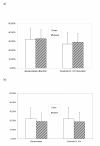Associations between dietary habits and body mass index with gut microbiota composition and fecal water genotoxicity: an observational study in African American and Caucasian American volunteers - PubMed (original) (raw)
Comparative Study
Associations between dietary habits and body mass index with gut microbiota composition and fecal water genotoxicity: an observational study in African American and Caucasian American volunteers
Volker Mai et al. Nutr J. 2009.
Abstract
Background: African Americans (AA) suffer from an increased incidence and mortality of colorectal cancer (CRC). Environmental exposures including dietary habits likely contribute to a high burden of CRC, however, data on the dietary habits of AA is sparse. Diet might change the composition and the activities of the intestinal microbiota, in turn affecting fecal genotoxicity/mutagenicity that is thought to be associated with carcinogenesis.
Methods: We assessed dietary habits by food frequency questionnaire and by food records in 52 AA and 46 CA residents of the Eastern Shore of MD. Fecal microbiota composition was determined using 16S rRNA based methods and fecal genotoxicity measured using the Comet assay.
Results: AA reported an increased intake of heterocyclic amines and a decreased dietary intake of vitamins including vitamin D (p<0.05) that correlated with differences in fecal microbiota composition but not fecal genotoxicity. Intake of dietary fiber, calcium, total fat and heterocyclic amines correlated with differences in microbiota composition. Total bacterial counts/g of stool and raw counts of Bacteroides were increased in AA. In contrast to a previous study, BMI was not associated with proportions of Bacteroides.
Conclusion: Dietary habits of African Americans, including increased HCA intake and decreased vitamin D intake might at least partially contribute to CRC through modifications of gut microbiota composition that result in changes of the intestinal milieu.
Figures
Figure 1
DNA damage and viability of HT 29 cells after incubation with FW. AAs (n = 21), CAs (n = 22), males and females. NaCl -- negative control; H2O2 -- positive control.
Figure 2
Comparison of microbiota between AA and CA. Fixed stool samples were hybridized with probes directed against Bacteroidetes (Bac 303), Clostridium Cluster XIVa (Erec482), Bifidobacteria (Bif164) and Lactic Acid bacteria (Lab158) and enumerated by FISH as described in Materials and Methods. Total bacterial counts were determined using DAPI.
Figure 3
Proportions of bacteroidetes and Clostridia Cluster XIVa in obese vs. lean subjects as determined by a) FISH and b) qPCR analysis.
Similar articles
- Impact of palm date consumption on microbiota growth and large intestinal health: a randomised, controlled, cross-over, human intervention study.
Eid N, Osmanova H, Natchez C, Walton G, Costabile A, Gibson G, Rowland I, Spencer JP. Eid N, et al. Br J Nutr. 2015 Oct 28;114(8):1226-36. doi: 10.1017/S0007114515002780. Br J Nutr. 2015. PMID: 26428278 Clinical Trial. - Association of dietary type with fecal microbiota in vegetarians and omnivores in Slovenia.
Matijašić BB, Obermajer T, Lipoglavšek L, Grabnar I, Avguštin G, Rogelj I. Matijašić BB, et al. Eur J Nutr. 2014 Jun;53(4):1051-64. doi: 10.1007/s00394-013-0607-6. Epub 2013 Oct 31. Eur J Nutr. 2014. PMID: 24173964 - A prospective cohort analysis of gut microbial co-metabolism in Alaska Native and rural African people at high and low risk of colorectal cancer.
Ocvirk S, Wilson AS, Posma JM, Li JV, Koller KR, Day GM, Flanagan CA, Otto JE, Sacco PE, Sacco FD, Sapp FR, Wilson AS, Newton K, Brouard F, DeLany JP, Behnning M, Appolonia CN, Soni D, Bhatti F, Methé B, Fitch A, Morris A, Gaskins HR, Kinross J, Nicholson JK, Thomas TK, O'Keefe SJD. Ocvirk S, et al. Am J Clin Nutr. 2020 Feb 1;111(2):406-419. doi: 10.1093/ajcn/nqz301. Am J Clin Nutr. 2020. PMID: 31851298 Free PMC article. - Epidemiology of fecal mutagenicity.
Schiffman MH. Schiffman MH. Epidemiol Rev. 1986;8:92-105. doi: 10.1093/oxfordjournals.epirev.a036297. Epidemiol Rev. 1986. PMID: 3533586 Review. - Evaluation of fecal mutagenicity and colorectal cancer risk.
de Kok TM, van Maanen JM. de Kok TM, et al. Mutat Res. 2000 Jul;463(1):53-101. doi: 10.1016/s1383-5742(00)00003-x. Mutat Res. 2000. PMID: 10838209 Review.
Cited by
- Dietary Strategies for Management of Metabolic Syndrome: Role of Gut Microbiota Metabolites.
Croci S, D'Apolito LI, Gasperi V, Catani MV, Savini I. Croci S, et al. Nutrients. 2021 Apr 21;13(5):1389. doi: 10.3390/nu13051389. Nutrients. 2021. PMID: 33919016 Free PMC article. Review. - Stereotypes About Enterotype: the Old and New Ideas.
Cheng M, Ning K. Cheng M, et al. Genomics Proteomics Bioinformatics. 2019 Feb;17(1):4-12. doi: 10.1016/j.gpb.2018.02.004. Epub 2019 Apr 23. Genomics Proteomics Bioinformatics. 2019. PMID: 31026581 Free PMC article. Review. - The Intestinal Microbiome in Bariatric Surgery Patients.
Peat CM, Kleiman SC, Bulik CM, Carroll IM. Peat CM, et al. Eur Eat Disord Rev. 2015 Nov;23(6):496-503. doi: 10.1002/erv.2400. Epub 2015 Oct 1. Eur Eat Disord Rev. 2015. PMID: 26426680 Free PMC article. Review. - Polygala tenuifolia extract inhibits lipid accumulation in 3T3-L1 adipocytes and high-fat diet-induced obese mouse model and affects hepatic transcriptome and gut microbiota profiles.
Wang CC, Yen JH, Cheng YC, Lin CY, Hsieh CT, Gau RJ, Chiou SJ, Chang HY. Wang CC, et al. Food Nutr Res. 2017 Oct 5;61(1):1379861. doi: 10.1080/16546628.2017.1379861. eCollection 2017. Food Nutr Res. 2017. PMID: 29056891 Free PMC article. - Gut microbiota's effect on mental health: The gut-brain axis.
Clapp M, Aurora N, Herrera L, Bhatia M, Wilen E, Wakefield S. Clapp M, et al. Clin Pract. 2017 Sep 15;7(4):987. doi: 10.4081/cp.2017.987. eCollection 2017 Sep 15. Clin Pract. 2017. PMID: 29071061 Free PMC article. No abstract available.
References
- Satia-Abouta J, Galanko JA, Martin CF, Potter JD, Ammerman A, Sandler RS. Associations of micronutrients with colon cancer risk in African Americans and whites: results from the North Carolina Colon Cancer Study. Cancer Epidemiol Biomarkers Prev. 2003;12:747–754. doi: 10.1093/aje/kwg248. - DOI - PubMed
- Satia-Abouta J, Galanko JA, Potter JD, Ammerman A, Martin CF, Sandler RS. Associations of total energy and macronutrients with colon cancer risk in African Americans and Whites: results from the North Carolina colon cancer study. Am J Epidemiol. 2003;158:951–962. doi: 10.1002/ijc.20044. - DOI - PubMed
Publication types
MeSH terms
Substances
LinkOut - more resources
Full Text Sources
Other Literature Sources
Medical


